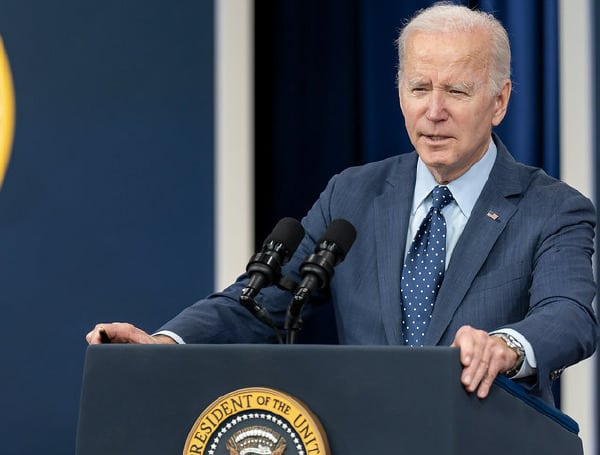In a significant geopolitical shift, the United States is reportedly preparing to lift a longstanding ban on the sale of offensive weapons to Saudi Arabia.
According to a Financial Times report, this move, which could occur in the coming weeks, signals a potential realignment in Washington’s approach to the Middle East and its regional strategic alliances.
The decision to ease these restrictions, as reported by the Financial Times, is a departure from the Biden administration’s earlier stance.
Read: Biden’s ‘Partisan’ Voter Registration Push May Violate Federal Law, Legal Experts Say
Soon after taking office in 2021, President Biden toughened the country’s position on Saudi Arabia’s military campaign against the Iran-aligned Houthis in Yemen. This conflict has resulted in heavy civilian casualties.
However, the winds of change appear to be blowing, and the US now seems poised to recalibrate its policies towards its long-standing ally in the Gulf. This article delves into the factors driving this shift, the potential implications for regional dynamics, and the broader strategic considerations at play.
The relationship between the United States and Saudi Arabia has long been complex and multifaceted, marked by cooperation and occasional tensions. The Biden administration’s initial move to restrict arms sales to Riyadh was seen as a departure from the more permissive policies of previous administrations, which had provided the Saudis with a steady stream of advanced military hardware for decades.
The primary catalyst for the Biden administration’s tougher stance was the Saudi-led military campaign against the Houthi rebels in Yemen, which had inflicted significant civilian casualties. In a bid to address these humanitarian concerns, the US had initially removed the Houthis from the terror watchlist in 2021, only to later reverse that decision in 2024 as the Houthis continued to attack international merchant ships in the Red Sea.
Alongside the Yemen conflict, the US has also sought to penalize Saudi Arabia over its record of human rights violations, particularly the 2018 killing of Washington Post journalist and political dissident Jamal Khashoggi. This incident had cast a long shadow over the bilateral relationship, with the Biden administration initially taking a more critical stance towards the kingdom.
However, the geopolitical landscape in the Middle East has been evolving, and the US now appears to be prioritizing the advancement of a broader normalization deal between Israel and Saudi Arabia. This potential agreement, which has been a top agenda item for the Biden administration, could have far-reaching implications for regional dynamics and the Israeli-Palestinian conflict.
The reported decision to lift the ban on offensive weapon sales to Saudi Arabia suggests that the Biden administration is reevaluating its approach to the kingdom, potentially seeking to strike a balance between its concerns over human rights and its broader strategic interests in the region.
Read: Watch: Texas DPS Find 15 Illegal Immigrants From Mexico Stuffed In Toolboxes And Rear Truck Cab
Saudi Arabia, the largest US arms customer, has chafed under the restrictions imposed by the Biden administration. The kingdom’s significance as a strategic ally in the Middle East, particularly in the context of the ongoing tensions with Iran, has likely played a role in the US’s calculus.
The administration’s efforts to advance the normalization deal between Israel and Saudi Arabia, which could be contingent on Israel’s willingness to accept Palestinian statehood as a long-term goal, underscores the complex web of regional dynamics that the US is navigating.
Some Biden officials have suggested that the administration is running out of time to secure a deal before the 2024 presidential election, and that it may soon choose to publicly present the diplomatic initiative and force Prime Minister Netanyahu to make a decision.
The potential lifting of the ban on offensive weapon sales to Saudi Arabia carries significant implications, both regionally and globally.
The renewed flow of advanced military hardware to the kingdom could have profound consequences for the ongoing conflict in Yemen, potentially exacerbating the humanitarian crisis in the region. Observers will be closely watching how the US navigates this delicate balance between its strategic interests and its commitment to addressing the humanitarian situation.
The normalization deal between Israel and Saudi Arabia, if realized, could reshape the geopolitical landscape in the Middle East, with potential ramifications for the Israeli-Palestinian conflict. The willingness of the US to press forward with this initiative, even in the face of resistance from the Israeli government, reflects the administration’s broader strategic calculus.
Read: CPAC Recognizes Rep. Greg Steube As The Most Conservative Lawmaker From Florida
The shift in the US’s approach to Saudi Arabia, and its willingness to recalibrate its policies based on evolving regional dynamics, underscores the complex and ever-changing nature of global diplomacy. As the world watches closely, the decisions made by the Biden administration in the coming weeks and months will have far-reaching implications for the US’s standing on the world stage and its ability to navigate the shifting sands of the Middle East.
Help support the Tampa Free Press by making any small donation by clicking here.
Android Users, Click To Download The Tampa Free Press App And Never Miss A Story. Follow Us On Facebook and Twitter. Sign up for our free newsletter.

